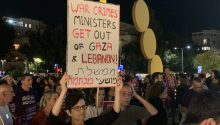by Alastair Crooke, Strategic Culture:

Israel is deeply fractured. The schism has become bitter and heated as both sides see themselves to be in an existential war for the future of Israel. The language used has become so venomous (particularly in reserved channels in Hebrew) that calls for a coup and for civil war are far from uncommon.
Israel is nearing the precipice and the seemingly irreconcilable differences may soon erupt into civil unrest – as Uri Misgav writes this week, the “Israeli spring” is on its way.
TRUTH LIVES on at https://sgtreport.tv/
The point here is that President Trump’s utilitarian and determinedly transactional style may work effectively in the secular western hemisphere, but with Israel (or Iran) Trump may find little or no traction amongst those with an alternative weltanschauung that expresses a fundamental different concept of morality, philosophy and epistemology, to the classic western deterrence paradigm of material ‘carrots and sticks’.
Indeed, the very attempt to impose deterrence – and to threaten ‘all hell breaking out’ if his injunctions are not followed – may produce the opposite to that which he seeks: i.e. it may trigger new conflicts and wars.
An angry plurality in Israel (led for now, by Netanyahu) have taken the reins of power after a long march through the institutions of Israeli society, and now have their sights focussed on dismantling the ‘Deep State’ within Israel. Equally, there is a furious push-back to this perceived take-over.
What exacerbates this societal fracture are two things: Firstly, it is ethno-cultural; and second it is ideological. The third component is the most explosive – Eschatology.
At the last national election in Israel, the ‘underclass’ finally broke the glass ceiling to win election and to take office. The Mizrahi (Jews from the Middle East and North Africa) have been long treated as the poorer, lower order in society.
The Ashkenazi (European, largely liberal-secular Jews) form much of the urban professional (and until recently) the security class. These are the élites whom the coalition of National Religious and Settler Movement displaced at the last election.
This present phase to a long struggle to power perhaps can be put at 2015. As Gadi Taub has recorded,
“It was then, Israel’s Supreme Court judges removed sovereignty itself—that is, the power of final decision over the whole realm of law and politics—from the elected branches of government and transferred it to themselves. One unelected branch of government officially holds power, against which there are neither checks, nor balances, by any counterforce”.
In the optic of the Right, the self-awarded power of Judicial Review, gave to the Court power, Taub writes,
“to prescribe the rules of the political game – and not just its concrete results”. “Law enforcement then became the huge investigative arm of the press. As was true of the “Russiagate” hoax, The Israel Police and State Attorney were not so much collecting evidence for a criminal trial as they were producing political dirt for leaks to the press”.
The ‘Deep State’ in Israel is a consuming point of contention for Netanyahu and his cabinet: In a speech at the Knesset this month – as one example – Netanyahu savaged the media, accusing news outlets of “full cooperation with the deep state” and of creating “scandals”. “The cooperation between the bureaucracy in the deep state and the media didn’t work in the United States, and it won’t work here”, he said.
Just to be clear, at the time of the last general election, the Supreme Court was composed of 15 Judges, all of whom were Ashkenazi, bar one Mizrahi.
Nevertheless, it would be wrong to see the war of the rival blocs as some arcane dispute about the usurpation of executive power – and a lost ‘separation of state powers’.
The struggle is rooted rather, in a profound ideological dispute about the future and character of the State of Israel. Will it be a messianic, Halacha state obedient to Revelation? Or, in essence, will there be a democratic, liberal, largely secular ‘state’. Israel is shredding itself on the blade of this debate.
The cultural component is that the Mizrahim (loosely defined) and the Right view the European liberal sphere as barely truly Jewish. Hence their determination that the Land of Israel should be wholly immersed in Jewishness.
It was the events of 7 October that absolutely crystalized this ideological struggle, which is the second key factor largely mirroring the general schism.
Israel’s classical security vision (dating from the Ben-Gurion era) was configured to provide an answer to the enduring Israeli dilemma: Israel cannot impose an end to conflict on its enemies, yet at the same time, it cannot maintain a large army in the long term.
Therefore, Israel – in this optic – had to rely on a reserve army that needed adequate security warning before any war occurred. Advance intelligence warning of coming war therefore, was a paramount requirement.
And that key presumption blew apart on 7 October.
The shock and sense of collapse arising from 7 Oct led many to think that the Hamas attack had irrevocably broken the Israeli concept of security – the policy of deterrence had failed and the proof of that was that Hamas was not deterred.
But here, we approach the crux of the Israeli internal war: What was destroyed on 7 Oct was not just the old security paradigm of the Labour Party and the old security elites. It did that; but what arose from its ashes was an alternative weltanschauung that expressed a fundamentally different concept in philosophy and epistemology to the classic deterrence paradigm:
Read More @ Strategic-Culture.org



